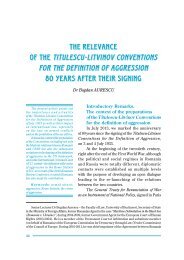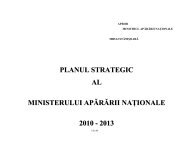You also want an ePaper? Increase the reach of your titles
YUMPU automatically turns print PDFs into web optimized ePapers that Google loves.
Turkish state was therefore recognized, while its<br />
borders in Europe were established according to<br />
the situation from 1913, like they were after the<br />
end of the Second Balkan War. The public debt of<br />
the former Ottoman Empire was divided among<br />
the states which took over territories, the regime<br />
of capitulations and the financial control over the<br />
Turkish state were abolished and a population exchange<br />
took place between Greece and Turkey.<br />
The free circulation in the Straits of all ships<br />
and aircraft (civilian and military) was proclaimed,<br />
in accordance to several cases – in peacetime, in<br />
wartime, with Turkey as a belligerent power, with<br />
Turkey neutral, etc. The Bosporus and Dardanelles<br />
Straits were demilitarized on a length of 15 to 20<br />
km, with the exception of Constantinople (Istanbul),<br />
which could keep a garrison of 15 000 soldiers. The<br />
Commission of the Straits was established, which<br />
was presided by the representative of Turkey and<br />
having one delegate from each of the littoral states.<br />
The treaty transformed the Black Sea in a free<br />
and open <strong>sea</strong> to navigation for all countries, regardless<br />
whether the ships belonged to the littoral<br />
or non-littoral states or whether they were trade<br />
ships or war ships. 6<br />
The Conference of Lausanne, in spite of all<br />
the tensions, played an important role in stabilizing<br />
the relations among the states from South-<br />
Eastern Europe and in diminishing the strong contradictions<br />
that plagued this geographic area for a<br />
long time. The agreement was the first act which<br />
revised the system built on the Paris Peace Conference,<br />
abolishing the Treaty of Sèvres. At the<br />
same time, it officially confirmed the disappearance<br />
of the Ottoman Empire, the great power that<br />
had dominated the region for five centuries.<br />
The positive collaboration between the Romanian<br />
and Greek delegations during the Conference<br />
of Lausanne contributed to the development of bilateral<br />
relations, which became closer. For instance,<br />
on July 1925, the Romanian government<br />
agreed to the proposal of the Greek Minister of<br />
Foreign Affairs, Constantin Rentis, concerning the<br />
signing of some treaties of arbitration by Greece,<br />
Romania and the Kingdom of Serbs, Croats and<br />
Slovenes (Yugoslavia since 1929), as a fist step towards<br />
the signing of a security pact or even the<br />
constituting of an alliance of the three countries.<br />
The talks that followed did not lead to the materialization<br />
of the project, but did soothe the tensions<br />
in the Balkans.<br />
����� Review of Military History �����<br />
The initiative of the Turkish and Greek governments<br />
concerning the setting up of a Balkan<br />
Pact illustrates this new atmosphere. The Romanian<br />
government considered that several conditions<br />
must be met in order to make this formula<br />
successful: things should not be rushed; no mentioning<br />
of any state; no outside hegemony in the<br />
Balkans; all the Balkan states should take part.<br />
The Balkan Pact project was eventually abandoned<br />
because of the opposition of France, which favored<br />
a formula similar to the Little Entente, the alliance<br />
created in 1920-1921 by Romania, Czechoslovakia<br />
and the Kingdom of Serbs, Croats and<br />
Slovenes. 7<br />
An important moment in the evolution of bilateral<br />
relations was the signing, in March 12, 1928<br />
in Geneva, of the Pact of nonaggression and arbitrage.<br />
Through this document, the parties committed<br />
themselves not to attack each other, not to<br />
invade their territories and not to declare war<br />
against each other. The use of force was allowed<br />
only in the cases of self-defense stipulated in the<br />
Covenant of the League of Nations. The Covenant<br />
also provisioned methods of solving the disputes in<br />
the spirit of the norms established by the forum in<br />
Geneva. The exchange of the instruments of ratification<br />
took place on July 5, 1929.<br />
In the same year, during the reunion of the<br />
International Labor Organization in Athens, the<br />
former Greek prime-minister, Alexandros Papanastassiou,<br />
proposed the convocation of an informal<br />
conference of the Balkan states. The latter gave<br />
their consent, thus laying the grounds of a period<br />
of political effervescence in the region, the first<br />
such reunion taking place in Athens on October 5-<br />
12, 1930. The statute of the conference stipulated<br />
that the fundamental goal of the reunion was the<br />
rapprochement among the Balkan states from all<br />
points of view. Three such reunions followed –<br />
Istanbul (October 1931), Bucharest (October 1932)<br />
and Thessaloniki (November 1933), while the fifth,<br />
initially planned to take place in Belgrade and later<br />
moved to Istanbul, never took place. As they were<br />
nongovernmental bodies, they could not have possibly<br />
solved the numerous problems in the region,<br />
some of them decades or centuries old, but the<br />
topics of discussions and the proposed solutions<br />
did contribute to a significant rapprochement of<br />
the countries from this geographic area.<br />
Regarding naval collaboration, we must mention<br />
another revealing fact. At the end of August<br />
57

















